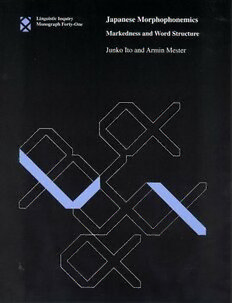Download Japanese Morphophonemics: Markedness and Word Structure (Linguistic Inquiry Monographs) PDF Free - Full Version
Download Japanese Morphophonemics: Markedness and Word Structure (Linguistic Inquiry Monographs) by Junko Ito, Armin Mester in PDF format completely FREE. No registration required, no payment needed. Get instant access to this valuable resource on PDFdrive.to!
About Japanese Morphophonemics: Markedness and Word Structure (Linguistic Inquiry Monographs)
The sound pattern of Japanese, with its characteristic pitch accent system and rich segmental alternations, has played an important role in modern phonology, from structuralist phonemics to current constraint-based theories. In Japanese Morphophonemics Junko Ito and Armin Mester provide the first book-length treatment of central issues in Japanese phonology from the perspective of Optimality Theory.In Optimality Theory (OT), a generative grammar (including its phonological component) is built directly on the often conflicting demands of different grammatical principles and incorporates a specific kind of optimization as the means of resolving these conflicts. OT offers a new perspective from which to view many of the processes, alternations, and generalizations that are the traditional subject matter of phonology. Using the phonology of compounds as an analytical thread, Ito and Mester revisit central aspects of the sound pattern of Japanese and submit them to the rigor of OT. In pursuing both well-known and less-explored issues in this area, they show that an optimality-theoretic approach not only provides new solutions to old puzzles but also suggests interesting new questions for both descriptive work and theoretical research.
Detailed Information
| Author: | Junko Ito, Armin Mester |
|---|---|
| Publication Year: | 2003 |
| ISBN: | 9781423729945 |
| Pages: | 317 |
| Language: | English |
| File Size: | 1.905 |
| Format: | |
| Price: | FREE |
Safe & Secure Download - No registration required
Why Choose PDFdrive for Your Free Japanese Morphophonemics: Markedness and Word Structure (Linguistic Inquiry Monographs) Download?
- 100% Free: No hidden fees or subscriptions required for one book every day.
- No Registration: Immediate access is available without creating accounts for one book every day.
- Safe and Secure: Clean downloads without malware or viruses
- Multiple Formats: PDF, MOBI, Mpub,... optimized for all devices
- Educational Resource: Supporting knowledge sharing and learning
Frequently Asked Questions
Is it really free to download Japanese Morphophonemics: Markedness and Word Structure (Linguistic Inquiry Monographs) PDF?
Yes, on https://PDFdrive.to you can download Japanese Morphophonemics: Markedness and Word Structure (Linguistic Inquiry Monographs) by Junko Ito, Armin Mester completely free. We don't require any payment, subscription, or registration to access this PDF file. For 3 books every day.
How can I read Japanese Morphophonemics: Markedness and Word Structure (Linguistic Inquiry Monographs) on my mobile device?
After downloading Japanese Morphophonemics: Markedness and Word Structure (Linguistic Inquiry Monographs) PDF, you can open it with any PDF reader app on your phone or tablet. We recommend using Adobe Acrobat Reader, Apple Books, or Google Play Books for the best reading experience.
Is this the full version of Japanese Morphophonemics: Markedness and Word Structure (Linguistic Inquiry Monographs)?
Yes, this is the complete PDF version of Japanese Morphophonemics: Markedness and Word Structure (Linguistic Inquiry Monographs) by Junko Ito, Armin Mester. You will be able to read the entire content as in the printed version without missing any pages.
Is it legal to download Japanese Morphophonemics: Markedness and Word Structure (Linguistic Inquiry Monographs) PDF for free?
https://PDFdrive.to provides links to free educational resources available online. We do not store any files on our servers. Please be aware of copyright laws in your country before downloading.
The materials shared are intended for research, educational, and personal use in accordance with fair use principles.

